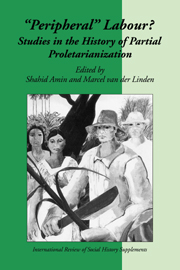Book contents
- Frontmatter
- Contents
- Introduction
- Colonialism, Capitalism and the Discourse of Freedom
- The Barriers to Proletarianization: Bolivian Mine Labour, 1826–1918
- Labour, Ecology and History in a Puerto Rican Plantation Region: “Classic” Rural Proletarians Revisited
- Coal and Colonialism: Production Relations in an Indian Coalfield, c. 1895–1947
- “Capital Spectacles in British Frames”: Capital, Empire and Indian Indentured Migration to the British Caribbean
- Unsettling the Household: Act VI (of 1901) and the Regulation of Women Migrants in Colonial Bengal
- Sordid Class, Dangerous Class? Observations on Parisian Ragpickers and their Cités During the Nineteenth Century
- Notes on Contributors
Colonialism, Capitalism and the Discourse of Freedom
Published online by Cambridge University Press: 14 October 2009
- Frontmatter
- Contents
- Introduction
- Colonialism, Capitalism and the Discourse of Freedom
- The Barriers to Proletarianization: Bolivian Mine Labour, 1826–1918
- Labour, Ecology and History in a Puerto Rican Plantation Region: “Classic” Rural Proletarians Revisited
- Coal and Colonialism: Production Relations in an Indian Coalfield, c. 1895–1947
- “Capital Spectacles in British Frames”: Capital, Empire and Indian Indentured Migration to the British Caribbean
- Unsettling the Household: Act VI (of 1901) and the Regulation of Women Migrants in Colonial Bengal
- Sordid Class, Dangerous Class? Observations on Parisian Ragpickers and their Cités During the Nineteenth Century
- Notes on Contributors
Summary
In the history and historiography of labour servitude, the ideology of modernity and progress looms large. Thus it was with bitter irony that a British officer described the miserable condition of a labourer in late nineteenth-century colonial India: “Steam, the great civilizer, has not done much for this man, although the railroad runs within a few hundred yards of his door.” The persistence of the miserably poor existence was bad enough, but truly appalling was the fact that the introduction of modern industry had not set the labourer free. The poor labourers, or kamias as they were called locally, had seen modernity whizz past them without carrying them along in its journey to progress and freedom.
The expectation that the abolition of unfreedom, even if it was “a very long time in coming”, was bound to happen with “the advance of modern ideas, open communications and opportunities for industrial labour” was part of an ideology rooted in the post-Enlightenment belief that freedom constituted the natural human condition. This post- Enlightenment discourse enunciated two fundamental propositions. First, that free labour was the natural and the normative form. Thus, even as the Enlightenment philosophes offered a tortuous defence of the enslavement of Africans, they also represented freedom as the essence of humanity and servitude as its negation. Indeed, Adam Smith attacked slavery as a system of restraints that stifled the slaves' pursuit of their self-interests and impeded the development of free labour.
- Type
- Chapter
- Information
- Peripheral LabourStudies in the History of Partial Proletarianization, pp. 9 - 26Publisher: Cambridge University PressPrint publication year: 1997
- 1
- Cited by

